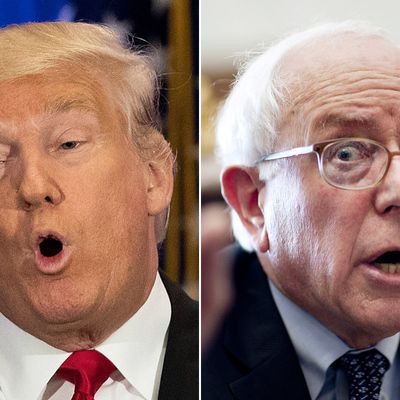
With yesterday’s remarkable shrieking diatribe about the perfidy of globalization and international trade deals, tellingly delivered in a former Pennsylvania steel town, Donald Trump seems to be making a big strategic gamble. Without question, this speech deeply offended, perhaps terminally, a lot of the old Chamber of Commerce–type Republicans all over the country, who view Trump’s style of protectionism as both evil and stupid. It’s almost impossible that it won’t lose him at least some votes and a lot of money.
Offsetting that, Trump presumably believes, could be a crucial sliver of the vote in trade-impacted Rust Belt states like Pennsylvania, Ohio, and Michigan — voters who might have even supported Bernie Sanders or similar anti-trade labor-oriented Democratic pols in the recent past. Doubling down on the white working-class vote by poaching Sanders supporters who already have a dim view of Hillary Clinton does make some sense at first blush. And Trump took care in his speech yesterday to quote Sanders and to cite research from the left-labor Economic Policy Institute.
But the question immediately presents itself: Are Bernie Sanders voters mostly horny-handed sons and daughters of toil, the quintessential 55-year-old former manufacturing worker now getting by as a Walmart greeter? Not really. The further we got into the Democratic presidential nominating contest the more it became obvious that age, more than economic class or ideology, was what was mostly feeding the Bern. And young Sanders supporters were much more likely to be motivated by a desire for free tuition or forgiven student loans, or legalized pot, or maybe busting up the big banks, than by a determination to cancel NAFTA. Indeed, polling has consistently shown that millennials are reflexively more positive about globalization generally and trade expansion specifically than their elders.
Nor was it obvious that anger over trade agreements was sweeping the Rust Belt during the Democratic primaries. In Pennsylvania, where Trump conjured up the protectionist ghosts of Smoot and Hawley, Democratic primary participants said trade “creates” rather than “takes away” jobs by a 44-42 margin. Hillary Clinton, by the way, won both categories of voters. But even in states like Michigan and Ohio where anti-trade sentiment was stronger among Democrats, neither Sanders nor Clinton voters were monolithically on either side of the question. So the idea of a big batch of Bernie voters ripe for the picking because Donald Trump is promising to somehow make Mexico and China cough up and return to the U.S. the jobs they’ve “stolen” is dubious from the get-go. Even for those Sanders voters primarily concerned with trade (probably not a large number), the difference in rhetoric and substance between Sanders’s desire for a “win-win” set of policies (once upon a time called the Global New Deal idea) that protect American jobs without ravaging the poor in developing countries is emotionally pretty far away from Trump’s demands for zero-sum trade wars aimed gleefully at reimpoverishing poor people not lucky enough to be American.
To the extent Bernie supporters are young, they are strongly at odds with Trump on more issues than you can count, from college debt to immigration to tax policy to his support for torture and killing non-combatants, not to mention abortion and same-sex marriage.
The bottom line is that Trump better hope he can convince the millions of business-oriented Republicans who imbibed free-trade ideology from infancy to vote for him on other issues. Otherwise his big Rust Belt gamble is likely to fail.






























